Wisdom Tooth Extractions – Houston, TX
Comfortable, Gentle Wisdom Tooth Removal from Our Skilled Oral Surgeons
As oral and maxillofacial surgeons, we get a lot of questions, but one of the ones we field most often is, “Do I need to have my wisdom tooth / teeth extracted?” Almost everyone will be faced with this question at some point, but the decision about whether or not to have wisdom teeth removed should be left up to the individual patient and their dentist. Your general dentist or one of our oral surgeons can help you evaluate the specific conditions of your wisdom tooth. Although many individuals benefit from the removal of their wisdom teeth, others may not derive significant benefits, and tooth removal may not be recommended. Keep reading to learn everything you would want to know about wisdom teeth, including their cost, how to budget for them, why they may need to be removed, and what you can expect from the procedure. If you have questions or want to schedule a consultation, contact the trusted oral surgeons at Piney Point Oral & Maxillofacial Surgery to learn more about wisdom tooth extractions in Houston, TX.
Select a Wisdom Tooth Extraction Topic Below to Learn More
Can I Afford Wisdom Tooth Extraction?

The cost of a wisdom tooth removal will vary based on several key factors. These include the number of wisdom teeth being extracted, as not every patient will have all four wisdom teeth. It will also depend on whether the tooth is impacted (stuck under the gums or partially emerged) as well as the formation of the oral structures and tissues around it. The type of sedation used during your procedure in addition to the local aesthetic will also influence the cost of removing your wisdom teeth.
Wisdom tooth removal often costs more than other tooth extractions simply because they’re usually more complex. When a tooth is extracted after it has fully emerged from the gums, it’s called a simple extraction. While this can be the case for some wisdom teeth, most need to be removed before this point, either while they’re fully or partially underneath the gum tissue. These types of extractions require minor surgery, and thus more precision, expertise, and cost. Fortunately, most dental insurance policies offer some form of coverage for wisdom tooth removal to help with the price, and having wisdom teeth removed early can prevent serious and expensive complications in the future.
What Should I Budget for Wisdom Tooth Extraction?

What will you need to plan for when budgeting for wisdom tooth extraction? The cost of your treatment will include the removal procedure itself, the anesthetic or sedation options you request, your consultation, preliminary X-rays and imaging, and any preparatory procedures you may need. Depending on the state of your oral health, you may need a dental deep cleaning to minimize your risk of infection or complication after your wisdom tooth extraction. If your wisdom tooth is severely impacted or damaging other teeth, advanced imaging may be needed to capture important details that can’t be seen with an X-ray.
What is the Typical Cost of Wisdom Tooth Extraction?

The cost of a wisdom tooth extraction will vary based on how many teeth are being removed, the complexity of the case, the cost of the initial exam, X-rays, and sedation. Typically, the range you can expect for these factors is as follows:
- Extraction per tooth: $292 to $1,000 (depending on the complexity of the case)
- Total for removing all 4 wisdom teeth: $616 to $5,950
- Exam and X-rays: $0 (included) to $502
- Sedation: $97 to $600 (depending on the type, such as nitrous oxide or IV sedation)
How Much Does Wisdom Teeth Extraction Cost Around Houston?
For your convenience, we’ve gathered information about the cost of wisdom teeth extractions around Houston. Below is a brief overview of the price of an uncomplicated wisdom tooth removal, complex wisdom tooth removal, and the exam with X-rays in the regions around Houston.
General Dentist Vs Oral Surgeon: Who Should You See to Have Your Wisdom Teeth Removed?
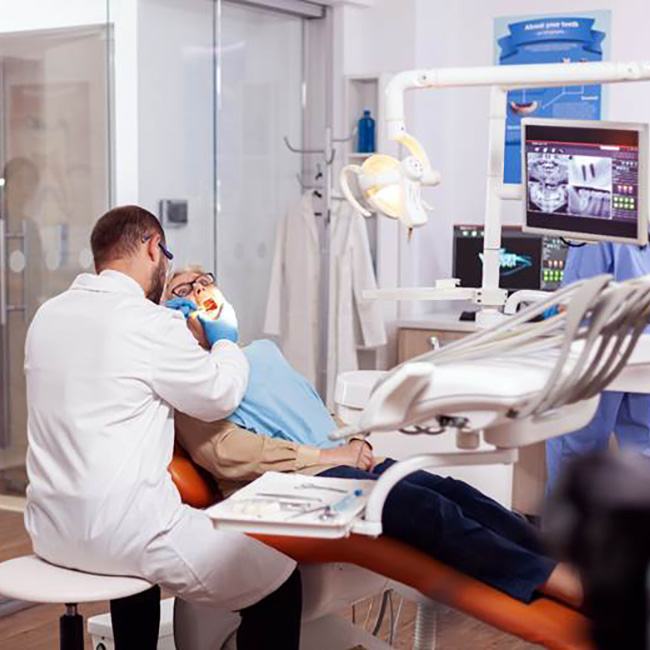
In some cases, a general or family dentist can extract a patient’s wisdom teeth. However, many dentists choose to refer their patients to a trusted oral surgeon instead, especially in more complex, severe, or impacted cases. Oral surgeons have years of advanced training in tooth extractions and other serious procedures, and since wisdom teeth are the most commonly removed teeth, oral surgeons are well-versed in how to perform wisdom tooth extractions. They are also more likely to have training and certification in sedation dentistry options such as IV sedation than a general dentist, which can ensure that your treatment goes smoothly and comfortably.
Remember, your dentist may recommend wisdom tooth removal even if you can’t see or feel them yet. Even if your wisdom teeth aren’t bothering you right now, having them extracted will likely save you the time and money of dealing with complications in the future.
Does My Dental Insurance Cover Wisdom Tooth Extraction?

Most dental insurance policies offer some level of coverage for wisdom tooth removal. Since it’s often classified as a “major procedure,” you can typically expect your dental insurance to cover 50-80% of the cost. However, it’s important to remember that every insurance plan offers different benefits, so you should investigate the details of your policy or contact your insurance provider to learn more about your coverage. The cost of your wisdom tooth extraction will also likely be influenced by your yearly maximum and deductible.
We’re proud to accept a number of popular dental insurance policies. Our experienced team here at Piney Point Oral & Maxillofacial Surgery has years of experience navigating the details of various plans, and we would be happy to help you review your benefits to help you learn more about your coverage for wisdom tooth extraction.
Affordable Payment Options & Financing at Piney Point Oral & Maxillofacial Surgery

Dental insurance benefits can offer a tremendous amount of assistance in terms of lowering your out-of-pocket cost for wisdom tooth removal. Additionally, many patients qualify for no-interest financing. This would allow you to break up the cost of your treatment into smaller, more manageable payments that fit easily into your monthly budget.
Comparing Wisdom Tooth Extraction Costs Between Houston Dentists

When shopping around for who to trust your smile to, remember that cheaper is not always better. Here are a few important things to keep in mind when comparing prices:
- Beware of suspiciously low-priced tooth extractions. These are likely only advertising the price of one part of your treatment, leaving you with unexpected costs along the way.
- Lower prices for wisdom tooth removal may only be for simple extractions, whereas more complex cases or impacted wisdom teeth will naturally cost more.
- Seeing a highly trained oral surgeon for wisdom tooth removal may cost more than a general dentist, but you should not entrust your oral health to a professional who doesn’t have the right experience or training for your unique situation, especially if you have a complicated case.
Piney Point Oral & Maxillofacial Surgery VS Corporate Oral Surgeons

Why do I Have Wisdom Teeth?
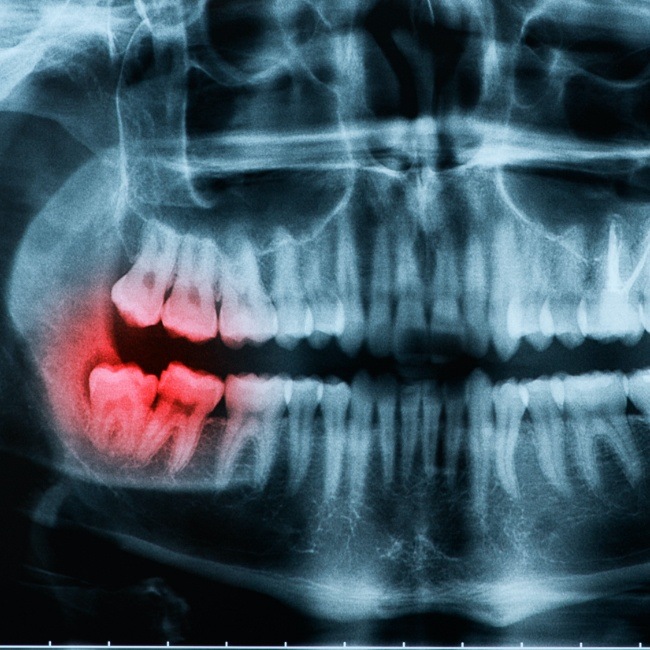
The wisdom teeth are actually a third set of molars at the very back of the mouth. These teeth may or may not erupt in late adolescence, usually between the ages of 16 and 24. If they do come through, there is rarely enough room for them to erupt (break through the gums) without issue. Our ancient ancestors needed this third set of molars as their coarse diet and lack of oral hygiene often led to tooth loss early in life. Today, our improved diet and the availability of preventive dental care mean most people don’t need an additional set of molars at this point in their life, and there isn’t room in the smile for these teeth to develop naturally. This lack of space can cause resulting oral health problems that range from minor to severe.
How do I Know My Wisdom Teeth Need to be Extracted?

In order to determine whether or not you should have your wisdom teeth removed, you’ll need to visit our Houston oral surgeons for a tooth extraction consultation and exam. During this visit, we’ll capture digital x-rays and carefully examine your bite. Our Houston oral surgeon will be looking for concerns like impaction (teeth that can’t erupt), shifting in smile alignment, and infections. We’ll also want you to tell us about any symptoms you’re experiencing associated with the development of your wisdom teeth. This can include pain, shifting teeth, bleeding gums as teeth erupt, and swelling or inflammation of the face and jawline. Once we’ve gathered all the necessary information, we’ll sit down with you one-on-one to discuss your treatment options and determine whether or not wisdom tooth removal is recommended.
Why are Wisdom Tooth Extractions Recommended?

Following your wisdom tooth extraction consultation, our oral surgeon may recommend extraction. There are a variety of reasons for these recommendations, including all of the following:
Overcrowding
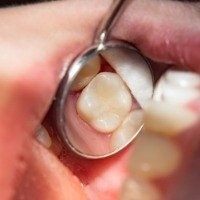
Around the time that wisdom teeth are coming in, many young people have just finished up orthodontic treatment to properly align their smiles. Some studies indicate that the development of third molars can lead to overcrowding and undo the effects of orthodontic treatments. If lack of space in the smile has the potential to cause misalignment or lead to impaction, wisdom teeth removal will likely be recommended.
Path of Eruption
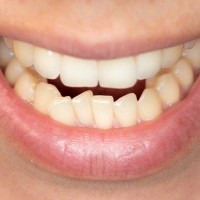
Another concern connected to smile alignment is the wisdom tooth’s path of eruption. Most permanent teeth follow the path of eruption from the primary teeth, but wisdom teeth don’t have a path to follow. For some people, this means the teeth erupt in improper alignment with the rest of the smile, or the teeth may be crooked within the socket when they erupt. In some cases, the wisdom teeth will even develop facing toward the surrounding teeth, which can lead to impaction or cause the smile to shift.
Infection

About 25-30% of wisdom teeth are removed due to pericoronitis. This is a localized infection of the gingival tissues (gums) associated with a partially erupted wisdom tooth, and it usually causes significant discomfort. In certain situations, this localized infection may spread and result in a more serious and even life-threatening infection called cellulitis. Treatment of pericoronitis usually involves the removal of both the upper and lower wisdom teeth. The upper wisdom tooth is removed because it impinges on the swollen gum tissue around the lower wisdom tooth., Due to the difficult if not impossible task of properly brushing and flossing around a partially erupted wisdom tooth, they are at greater risk of infection, and these teeth will more frequently develop dental decay (cavities) or periodontal (gum) disease.
Impaction
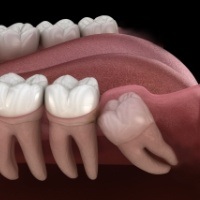
The term “impacted” describes a tooth that does not fully erupt from the gums. Wisdom teeth may be fully impacted, which means that the crown never breaks through the gum surface, or they may be partially impacted, which means only part of the tooth erupts. Impaction typically occurs because the mouth is too small to accommodate the wisdom teeth. Impacted wisdom teeth have the potential to cause a number of serious dental complications, including increased risk of tooth decay and infection, potential to damage other teeth and oral structures, and possibility of shifting the smile out of alignment. Additionally, a cyst may develop around the impacted tooth, leading to nerve, jawbone, or tooth damage.
Though wisdom tooth impaction does not always necessitate extraction, it is a condition that should be thoroughly evaluated to determine the overall effect on the rest of the mouth before it becomes a severe problem.
Sinus & Airway Issues

The sinuses are the empty pockets of air located in the skull and facial region. They make it easy to breathe, and there are sinuses in the forehead, cheekbones, and behind the nose. A sinus infection occurs when these spaces of air become inflamed. This type of infection is painful and may make it difficult to breathe. The wisdom teeth in the upper back jaw are close in proximity to the sinus cavity located behind the nose. When they start to grow in, the roots and teeth may place pressure on this area, which can lead to sinus headaches or infections. Taking the wisdom teeth out completely will remove the pressure from the sinuses, alleviating tension headaches, jaw pain, and other symptoms.
Pathological Conditions (Cysts & Tumors)
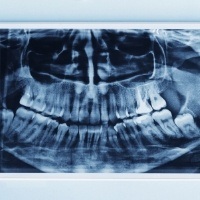
Approximately 1-2% of wisdom teeth are removed because of pathological conditions such as cysts or tumors. Although 1-2% sounds like a very low probability of a given individual experiencing one of these conditions, in a metropolitan area of one million people between 10,000 - 20,000 people will have some type of pathological condition associated with their wisdom teeth. Most of these conditions can be detected during routine dental exams through panoramic dental x-rays, and this is one reason that patients are recommended to have a panoramic x-ray taken every 3 to 5 years.
What Complications can Occur if I Don’t Remove My Wisdom Teeth?

Sometimes, wisdom teeth cause no symptoms at all, but in other cases, you may notice some changes that indicate a possible issue with your wisdom teeth, including the following:
- Your gums are red, swollen, bleeding, or tender
- A persistent ache or throbbing pain at the back of the jaw
- Pain when speaking or opening the jaw wide, making it difficult to fully open your mouth
- Discomfort in the ear, neck, or head
- Struggling with persistent bad breath
- There is an unpleasant taste in your mouth
- The lymph nodes in your neck experience occasional swelling
- Difficulty eating certain foods, which may impact nutrition
- Food often gets trapped in the area around your wisdom teeth
- Other teeth shifting out of alignment
- Loss of sleep due to chronic pain
- Infection which can spread throughout the body
What Should I do to Get Ready for My Wisdom Tooth Extraction Appointment?

If you and your oral surgeon decide that wisdom tooth extraction is the right option for your smile, you’ll receive a personalized treatment plan, including preoperative instructions. You can also review our Pre-Op Instructions page to learn more. The basics to keep in mind include:
- Clean your teeth immediately before your appointment.
- You should be accompanied by a responsible adult who can drive you to and from the appointment and monitor you during recovery. Legal minors must be accompanied by a parent or guardian
- You should have nothing to eat or drink for at least six hours prior to surgery. If you have to take sedative medication from the oral surgeon, it should be taken with only a sip of water.
- Wear loose fitting clothing and short sleeves. Do not wear tight collars, jewelry, or neckties.
- The most significant sedative effects wear off within an hour of treatment, but residual effects can last from 12 to 24 hours after the procedure.
What can I Expect on the Day of My Wisdom Tooth Extraction?

The extraction procedure itself will vary depending on the unique presentation of each patient. In some cases, teeth can be removed simply by applying traditional tooth extraction techniques. More commonly, wisdom teeth are sectioned, separated into smaller pieces, that can be removed one at a time. The advantages of this technique are that since bone removal is minimized, patients generally will heal more rapidly and will have less discomfort following the surgery.
Dental Sedation & Anesthesia Options

To ensure you maintain comfort throughout the most complex surgical tooth removal, our oral surgeons use a range of dental sedation and anesthesia options. Our recommendations will depend on your specific case, but we are able to offer a full range of options from the mildest combination of local anesthesia and nitrous oxide “laughing gas” dental sedation to complete sleep dentistry using general anesthesia.
Treatment Locations

Depending on the complexity of the procedure, we may be able to perform your wisdom tooth extraction in our oral surgery office. Our trusted oral surgeons in Houston also provide more advanced surgical treatments at local hospitals to ensure your safety during the procedure. Prior to your surgical visit, make sure you know where we will perform the tooth extraction.
Tooth Extraction Procedure
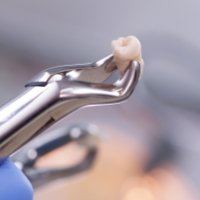
The length of your wisdom tooth extraction surgery will be dependent upon the complexity of your case. If wisdom teeth have fully erupted, we may be able to pull them, which can be done relatively quickly. For fully or partial impacted wisdom teeth, those that have become fully fused with the supportive structures, or teeth close to nerve structure that impedes ability to remove the tooth, surgical extraction will be necessary. These more advanced procedures can take several hours. Before the day of your appointment, we’ll let you know what the estimated surgical time is for your specific tooth extraction procedure.
How do I Care for Myself After Wisdom Tooth Extraction?

Following wisdom tooth extraction, you should expect to experience certain normal postoperative symptoms. These symptoms include mild to moderate bleeding that should decrease over the first few hours, but mild "oozing" from the extraction sites may continue for up to 2 days. Also, patients will experience some swelling, especially in the lower jaw, which may increase for 2-3 days postoperatively. Swelling should slowly start to resolve over the next week to ten days. Along with the swelling, it is normal to experience limitation to your range of jaw movement and discomfort with chewing. After removal of wisdom teeth, you will be given a set of postoperative instructions specific to your situation. You can also find general after care instructions on our website. In most cases, we recommend following the basic post-op care routine outlined below:
First Day After Tooth Extraction

- Medications – antibiotics and anti-inflammatory medications should be continued as directed and pain medication taken as needed.
- Ice Packs – ice packs should be used at 20-minute intervals throughout the first day, and it is not unusual to have increased swelling on the first day after surgery.
- Diet – full liquid diet should be continued throughout the day.
- Oral hygiene – you may begin brushing your teeth in front the first day after surgery, carefully avoiding the surgical sites until after your follow up visit.
Second Day After Tooth Extraction

- Medications – antibiotics and anti-inflammatory medications should be continued as directed and pain medication taken as needed.
- Ice Packs – ice packs should not be used the second day after surgery.
- Diet – a soft food diet may be started including scrambled eggs, mashed potatoes, and items of similar consistency.
Third Day After Tooth Extractions

- Medications – antibiotics should be continued until the entire prescription has been taken. Anti-inflammatory medication may be discontinued unless needed for relief of discomfort. Pain medication should be taken only if full relief of discomfort is not achieved with the anti-inflammatory medication.
- Heat – if symptoms of swelling, bruising, or stiffness are present, apply a heating pad or moist heat to the affected area three to four times daily for approximately 20 to 30 minutes each time. Heat should be continued until the symptoms subside, which may take several days.
- Diet – continue eating softer foods and reintroduce more difficult to chew foods as you feel comfortable, taking care to avoid the surgical site when chewing.
Dental Emergencies During Recovery

Proper care following oral surgery will hasten recovery and prevent complication. Although tenderness is not unusual for several days, the patient should feel progressively better every day starting three to four days after surgery. Regular postoperative visits are scheduled 5 to 10 days following surgical procedures, but if severe throbbing pain or pain unrelieved by medication persists, please notify the oral surgery office. We may ask you to come in sooner.
What Complications Can Arise After Wisdom Tooth Extraction?

By following the postoperative care instructions, most patients are able to make a full recovery without concern, but there are some complications associated with this surgical treatment. We’ve outlined the most common complications that occur after wisdom tooth extraction below, but feel free to contact us if you’re concerned. If any unusual symptoms occur, you may reach your oral surgeon 24 hours a day by calling (832) 293-4912.
Dry Socket
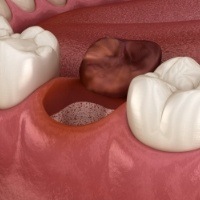
Following a tooth extraction, a blood clot forms over the top of the extraction site to promote healing and protect the sensitive nerve structure below. If this blood clot fails to form, breaks down too quickly, or becomes dislodged, patients may experience dry socket. This common postoperative complication, also called alveolar osteitis, affects between 3% and 25% of people. You will usually notice symptoms of dry socket two to five days after you tooth extraction. Common symptoms of dry socket include:
- After the blood clot is disrupted, the underlying bone and nerve tissue are exposed, which causes moderate to severe pain and temperature sensitivity. Some pain is normal, but severe pain or discomfort that lingers or increases after the first few days can indicate dry socket.
- Sometimes the jawbone can be seen with the naked eye after dry socket forms. Even if you can’t see the supportive bone structure, you will likely see an opening in the soft tissue.
- Patients may also note bad breath with a foul smell concentrated in the surgical area. A bad taste in the mouth may also occur.
- In some cases, severe facial swelling may occur.
It’s unknown what exactly causes dry socket, but risk factors include:
- Any type of tobacco use: smoking, chewing tobacco, etc.
- Taking oral contraceptives or receiving estrogen therapy
- Poor aftercare or insufficient oral hygiene
- Infection of the gums (periodontal disease) or supportive bone surrounding the extraction site that isn’t addressed prior to surgery
- Having had a dry socket in the past
- Not seeking treatment for swelling or serious inflammation of the face after tooth extraction
- Using a straw, rinsing, or spitting too soon after the extraction
- An untreated infection with low-grade fever or swollen glands prior to or after surgery
The treatment of dry socket consists of washing out the socket with a saline solution that removes food particles and bacteria buildup and placing a medicated packing into the socket. This usually provides significant relief of symptoms within an hour. The packing is removed after 5-7 days. We might also provide a medicated mouth rinse that you should use for several days to keep bacteria from the area and promote faster healing. The occurrence of dry socket will not affect the final quality of healing, but it can extend the length of healing time and cause significant discomfort.
Infection
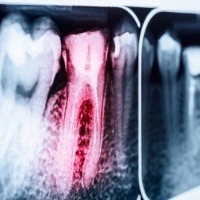
Although postoperative infections after the removal of wisdom teeth are rare, any infection left without treatment can become severe. As stated above, one of the reasons people have their wisdom teeth removed is because of infection. Therefore, some patients will already have an infection associated with their wisdom teeth at the time of surgery. Even after the removal of wisdom teeth, these patients may require further treatment to resolve the infection. Typically, this includes taking antibiotic pills and/or using an antimicrobial oral rinse. Rarely, patients may develop a chronic, low grade infection of the bone at the extraction site, even weeks after the tooth was removed. This chronic infection of the bone (osteomyelitis) may require further antibiotic therapy and/or surgical debridement.
Numbness

Due to the proximity of the wisdom teeth to the various nerves in the jaw, the removal of these teeth has been associated with a 1-3% incidence of temporary numbness to the lips, gums, teeth, or tongue. The majority of temporary numbness occurs in the lower lip and may last 4-6 weeks. A very small percentage of these patients experience a permanent sensory deficit to one of these areas. In the exquisitely rare cases of permanent changes in sensation, it should be noted that patients do not look different, drool, or talk differently. Of the areas at risk, the tongue can be the most bothersome to the patient, potentially affecting taste. If a patient experiences a numbing of the tongue without improvement after 4-6 weeks, consideration may be given to exploration and repair of the nerve.
Less Common Complications

Other complications associated with the removal of wisdom teeth include damage to adjacent teeth, displacement of upper wisdom teeth into the maxillary sinuses, thermal sensitivity to adjacent teeth, pain or dysfunction of the jaw joint (TMJ), and limited ability to open and close the mouth. Sinus complications including infection occur rarely and may require additional treatment or surgery.
Coronectomy
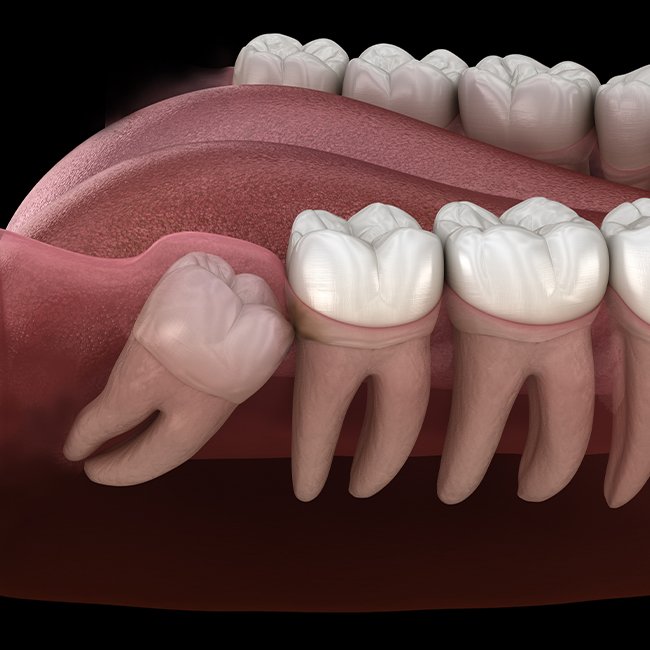
Normally, a wisdom tooth extraction involves taking the entire tooth out of the mouth, but this is not always necessary. If a wisdom tooth has healthy roots that aren’t causing any problems, or if the roots are positioned very close to a sensitive nerve, we may perform what is called a coronectomy. The crown, or upper portion of the tooth, is separated from the roots and removed, while the roots are left in place. This makes the procedure much less invasive, leading to a faster and more comfortable recovery.
Wisdom Tooth Extraction
Frequently Asked Questions
We know that undergoing any surgical procedure can be stressful, and you’ll have plenty of questions for us. Our knowledgeable team members are always happy to help. Below, we’ve compiled the answers to some of the wisdom tooth extraction frequently asked questions we field regularly.
At What Age Should Wisdom Teeth Be Removed?
Many people have their wisdom teeth removed between the ages of 17 and 25 before the bone develops to the point where extraction may be more difficult. However, there are no set-in-stone rules for when wisdom teeth should be removed. Patients older than 25 often have successful extraction procedures.
What Factors Should I Consider When I’m Deciding Whether or not to Get My Wisdom Teeth Extracted?
Keep in mind that wisdom teeth extractions aren’t necessary for everyone. When deciding whether or not you should undergo this procedure, you should listen to your general dentist or oral surgeon’s advice. If they believe your third molars are currently posing a threat to your oral health or they may do so in the near future, extraction is likely the wisest choice.
Some patients have their wisdom teeth removed as a purely preventive measure. If you are thinking about doing this, be sure to thoroughly discuss the risks and rewards of the procedure with an experienced oral surgeon before you make your final decision.
What Symptoms Indicate that I Might Need Wisdom Teeth Extractions?
Some signs that indicate you should visit your dentist to discuss wisdom teeth extractions include:
- Soreness in the jaw (especially toward the back of the mouth)
- Gum problems around the wisdom teeth
- Pain in the wisdom teeth or the teeth next to them
- Difficulty keeping the wisdom teeth clean
Is the Extraction Surgery Painful?
Thanks to local anesthesia, sedation dentistry, and general anesthesia options, you can expect to feel nothing during the extraction surgery. However, you’re likely to experience some swelling and soreness afterward. Your oral surgeon in Houston will give you detailed post-operative instructions that will help to minimize your discomfort and make your recovery as smooth and efficient as possible. You should be back to feeling like your old self within one to two weeks.
How Much Does Wisdom Teeth Removal Cost?
The cost wisdom tooth extraction in Houston will depend on many factors, including:
- The number of wisdom teeth that are being extracted.
- The complexity of the procedure (whether or not the teeth are impacted as well as the formation of the oral structures around them).
- The type of sedation used (general anesthesia or IV sedation costs more than local pain-numbing methods).

